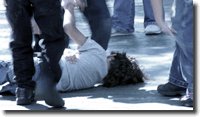About Drug Addiction
- Teen Drug Addiction
- Understanding Drug Addiction
- Effects of Drug Addiction
- Dangers of Drug Addiction
- Stages of Drug Addiction
- Signs of Drug Addiction
- Drug Addiction Withdrawal
- Drug Addiction Relapse
- Drug Addiction Facts
- Drug Addiction Overdose
- Drug Addiction Help
- Drug Addiction Intervention
- Drug Addiction Detox
- Drug Addiction Treatment
- Drug Addiction Rehab
- Drug Addiction Counseling
- What is a Drug Addict
- Drug Addiction Information
- Drug Addiction Statistics
- Drug Addiction Testing

Drug Addiction Overdose
 The term drug addiction overdose (or simply overdose) describes the ingestion or application of a drug or other substance in quantities greater than are recommended or generally practiced. A drug addiction overdose is widely considered harmful and dangerous as it can result in death.
The term drug addiction overdose (or simply overdose) describes the ingestion or application of a drug or other substance in quantities greater than are recommended or generally practiced. A drug addiction overdose is widely considered harmful and dangerous as it can result in death.
Types of Drug Addiction Overdose
The word "overdose" implies that there is a safe dosage; therefore, the term is commonly only applied to drugs, not poison. Drug overdoses are sometimes caused intentionally to commit suicide or as self-harm, but many drug overdoses are accidental and are usually the result of either irresponsible behavior or the misreading of product labels. Other causes of overdose include use of multiple drugs with counter indications simultaneously (for instance, heroin/certain prescription pain medications and cocaine/amphetamines/alcohol) and use after a period of abstinence or unexpected purity of the drug consumed.
A common unintentional overdose in young children involves multi-vitamins containing iron. Iron is a component of the hemoglobin molecule in blood, used to transport oxygen to living cells. When taken in small amounts, iron allows the body to replenish hemoglobin, but in large amounts it causes severe pH imbalances in the body. If this overdose is not treated with chelation therapy, it can lead to death or permanent coma.
Misconceptions
Deaths caused by adulterated drugs, most commonly heroin, are often incorrectly attributed to a drug addiction overdose.
Symptoms
Symptoms of a drug addiction overdose occur in various forms:
- Exaggerated form of normal action (e.g., sleepiness on antiepileptics, hypoglycemia on insulin)
- Other effects due to chemical properties of the medication (e.g., metabolic acidosis in aspirin, liver failure due to paracetamol)
- Non-specific symptoms due to central nervous system irritation (e.g., confusion, vertigo, nausea, vomiting, delirium, seizures)
Diagnosis
Diagnosis of an overdosed patient is generally straightforward if the drug is known. However, it can be very difficult if the patient cannot (or refuses to) state what drug they have overdosed on. At times, certain symptoms and signs exhibited by the patient, or blood tests, can reveal the drug in question. Even without knowing the drug, most patients can be treated with general supportive measures.
In some instances, antidotes may be administered if there is sufficient indication that the patient has overdosed on a particular type of medication. Naloxone in opioids and flumazenil in benzodiazepines, are specific receptor antagonists and they reverse completely the effect of the poisoning drug.
Drug Addiction Overdose and First aid
Depressants
First aid can prevent a death from overdose of depressants, as it may take several hours for someone to die in these cases. The common drugs in this category include opiates (ie. heroin, morphine and methadone), alcohol, and certain prescription drugs (such as Benzodiazepines). Signs of overdose are those of a depressed central nervous system â?? slow, infrequent or shallow breathing, blue lips or fingernails, cold or pale skin, slow or faint pulse, snoring or gurgling noises, and the inability to be aroused from nodding off (unresponsiveness).
The first step is to stay calm and try to get a response from the person by pinching the back of their arm, calling their name, or rubbing your knuckles against their chest.
If there is no response, check to make sure their airway is not blocked and see if they are breathing.
If breathing or pulse are not detectable, commence cardiopulmonary resuscitation. If these signs are present, roll the person in question on his/her side into the recovery position.
Call an ambulance. Ideally, someone should call an ambulance immediately while another person evaluates the patient and performs CPR if necessary.
Stimulants
People can overdose on stimulants, such as amphetamines, and cocaine, with symptoms such as rapid heartbeat, muscle cramps, seizures, paranoia, psychosis, confusion, loss of control of movement, vomiting, lack of consciousness, and possibly cardiac arrest. It can result in an often fatal condition known as excited delirium.
First aid in these cases involves staying with the person and helping them to remain calm. Move them to a quiet area, and where possible, apply a wet cloth to their neck or forehead. If unconscious, place them in the recovery position and call an ambulance.
Drug Addiction Overdose Prevention
Refrain from mixing depressant drugs like alcohol, barbiturates, benzodiazepines, and opiates together.
Start with small amounts, in order to estimate the potency of a drug.
Be careful when taking a drug after a period of abstinence, as your tolerance may be drastically lowered.
If you have a pharmaceutical chemical, make sure it isn't expired. Toxicity can increase drastically.
Drug Addiction
- Alcohol Addiction
- Adderall Addiction
- Ativan Addiction
- Cocaine Addiction
- Crack Addiction
- Ecstasy Addiction
- Heroin Addiction
- Lortab Addiction
- Marijuana Addiction
- Meth Addiction
- Methadone Addiction
- Morphine Addiction
- OxyContin Addiction
- Percocet Addiction
- Ritalin Addiction
- Vicodin Addiction
- Xanax Addiction
